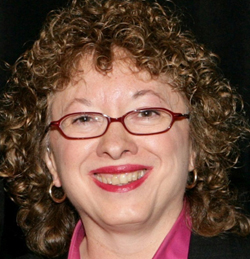With her background in science (a doctorate in anatomy and cell physiology from the University of Virginia School of Medicine and a post-doctoral fellowship in reproductive physiology and infertility at the University of Pennsylvania School of Medicine), Worrilow began a relentless crusade to find the cause of these anomalies.
The result LifeAire Systems, a company that produces air purification systems powerful enough to protect a fragile human embryo. But that’s not all — these systems can also be used in many situations to prevent disease from infancy to old age.
Launched just a year ago, the company has already installed its patented systems in 11 IVF clinics across the country, just hired two new employees, and has major plans for 2014.
What inspired you to found LifeAire Systems?
That’s easy: my respect for couples going through in-vitro fertilization. My entire career has been spent as a reproductive physiologist involved in IVF. Like all our colleagues, we would have changes in our clinical outcomes — our clinical pregnancy rate — that were beyond our control.
We would have a 50 percent pregnancy rate, and then we’d have a significant dip. We’d look at all the variables, but the one thing we didn’t really look at carefully was the impact of air quality on our outcomes, because we were operating within an ISO-5, Class 100 clean room. We thought we had taken that variable off the table — we had put in what we thought was the finest air purification system in existence. You could have followed a vaccine or built a computer chip [in that room].
It took us 10 years to understand how significant air quality was to our clinical outcomes, and what contaminants in the air are significant to successful growth of a human embryo. Once we understood that, we attempted to purchase an air purification system that would resolve this problem and provide the ambient air that our human embryos needed to thrive — there wasn’t anything available to take the air quality to the level that we needed.
So, when a couple would ask us our clinical pregnancy rate and we would say 52 percent, [that was true]. But, by the time they cycled through, if the hospital had resurfaced the Medevac pad, or if a neighboring industry had resurfaced their road, or some other event occurred outside the hospital, those subtle chemical and biological contaminants would get inside our lab, bypass our air purification system and have an impact on our success rate.
That, to me, was professionally and personally unacceptable. IVF is a very difficult process for anyone to go through, financially and medically. I wanted us to be technologically our very best. That’s what drove me to design this system. It was, in all honesty, done for our patients, and that’s still what gets me up in the morning.
How did you get the company started?
I pulled together the finest group of engineers, physicists, chemical engineers and clean-room engineers and said, “I’ve learned from 10 years of study that this is the environment the human embryo needs. So work backwards and make that happen, and by the way, we can’t produce any by-products.” I kept presenting the designers with problems that came up from the research.
We designed the system, patented it, and installed it for clinical use in two IVF programs three-and-a-half years ago. As a scientist, I needed data from third-party testing, proof, statistical significance. Not only the air-testing results (before and after) but the clinical outcome results have been overwhelmingly positive. We’re just thrilled.
We commercially launched a year ago, and we now have systems installed in 11 IVF programs across the country.
What resources did you take advantage of in launching LifeAire Systems?
My background is science, so that was my comfort level. Ben Franklin Technology Partners of Northeastern Pennsylvania were instrumental in providing resources and introducing me to individuals who could be helpful on the business side.
We did a “Friends and Family Round” for capital; we brought on H.T. Lyons as our manufacturing and engineering arm. It was very important to me to make it here in the Lehigh Valley and be able to quality-check every system. I can’t say enough about H.T. Lyons — they have been a phenomenal healthcare manufacturing and engineering design partner.
Ben Franklin also helped with setting up advisors and partners; it also helped with funding for our next phase.
I have become a member of Vistage, a national group of CEOs. They form groups of 20 in all major cities. We meet once a month and it’s been instrumental to our success.
How has the company grown so far?
We now have a distributor inside the IVF industry. We have five employees (we recently hired two), and we have an advisory board and board of directors. We outsource services such as website design, legal counsel and marketing.
What has been the biggest challenge?
Not enough hours in the day and very little sleep! I want every system that goes out the door to be flawless. These are going to colleagues and they’re protecting embryos. We keep pushing the technology to be better and better.
What’s the big differentiator for your company?
Our product is designed to remediate all forms of airborne pathogens, not just particulate or biological, but all categories. It’s a very aggressive design that doesn’t produce byproducts. Each stage of purification was designed specifically for a particular type of airborne pathogen.
What’s next for LifeAire Systems?
Since this is such an aggressive system, it can kill anthrax — the most difficult biological to kill. If you have the ability to kill anthrax, you can easily remediate the things that bother you and me, such as influenza, tuberculosis, C-diff and MRSA.
We are now talking with hospitals, long-term care facilities and biopharma facilities about placing this system in their facilities. It would protect patients from developing secondary infections, protect the compounding in pharmacies, protect infants in the NICU [neonatal intensive care unit] and children in the PICU [pediatric intensive care unit] and seniors in long-term care. It can also work in the operating room and burn units.
The timing now, with the Affordable Care Act, is really critical, to help reduce costs for hospitals. If you develop a secondary infection, you don’t pay for it and neither does insurance; it comes out of the hospital’s budget. This costs hospitals more than $30 billion per year. One out of every 20 inpatients develops a secondary infection; that’s 1.7 million people in the United States. We’re hoping this can reduce costs and improve patient outcomes.

http://www.lifeaire.com/
1275 Glenlivet Drive Suite 100 Allentown, PA 18106-3107
↑ Top


